The Lenovo ThinkPad X1 Carbon Review (2015)
by Brett Howse on May 21, 2015 8:00 AM EST- Posted in
- Laptops
- Lenovo
- ThinkPad
- Ultrabook
- Broadwell-U
Battery Life
With the introduction of Broadwell-U earlier this year, we have seen yet another step up in battery life on notebooks. It does not all come down to the CPU though, although having one that draws plenty of power while doing nothing is certainly not beneficial. Display technology is also a big factor, and we have seen quite strongly that the higher resolution panels can certainly struggle for battery life compared to more average resolution displays. If a device is to have truly great battery life, every single component needs to be sorted out, because any single one drawing extra power can have a significant effect on the overall battery life. The other factor of course is battery size, and the X1 Carbon has a 50 Wh battery.
To test battery life on notebooks, we have two tests. Our light workload consists of browsing four pages every minute with the display set to 200 nits. The heavy test gets a lot of the other components into the mix. The web browsing is increased to about twenty pages per minute, a video is played, and a 1 MB/s download is done to keep the wireless active.
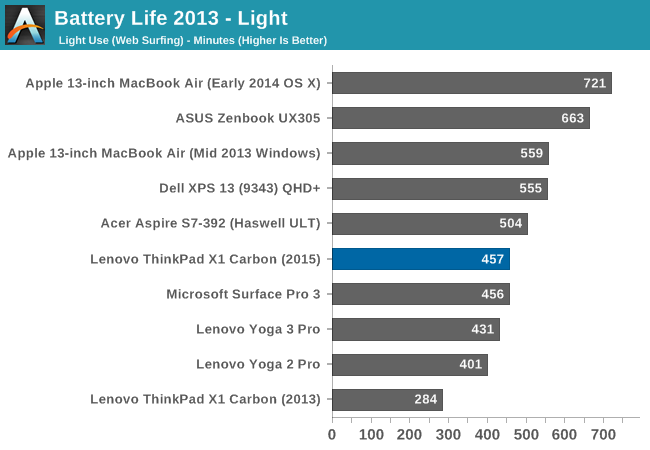
On our light test, the X1 Carbon is well off of the leaders in this test. It does seem odd to say that almost eight hours of battery life is not enough, but the bar has been raised this year. The X1 Carbon does have a slightly smaller battery, but as we will see in a bit that is not the reason for the lower than average result. A lot of this can likely come down to the display. In order to hit 200 nits, the display had to be set at 92% brightness which is quite a bit higher than most devices. Since this test is generally affected more by display power draw than any other, I would tend to think that this display is not the most efficient out there. It is always a bit of a guess though, since we cannot directly measure the power of each component.
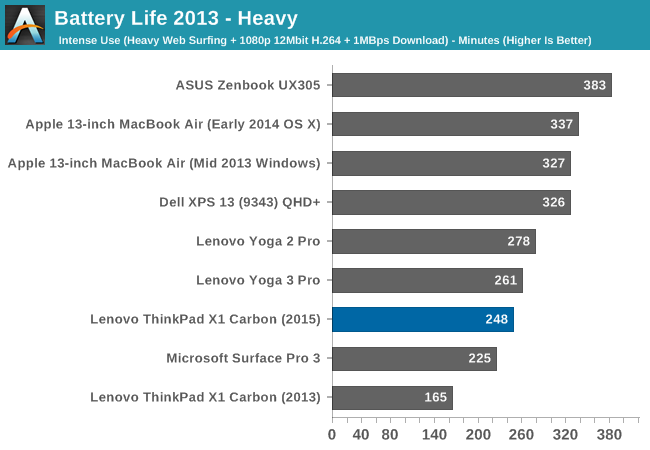
In the heavy test, the X1 Carbon falls even farther as the more efficient devices move past it. One thing to highlight from this test is the 2013 X1 Carbon. That was just two years ago, and battery life has skyrocketed since then.
Next we have our normalized graphs which show the amount of battery life divided by the size of the battery in order to judge how efficient each device is.
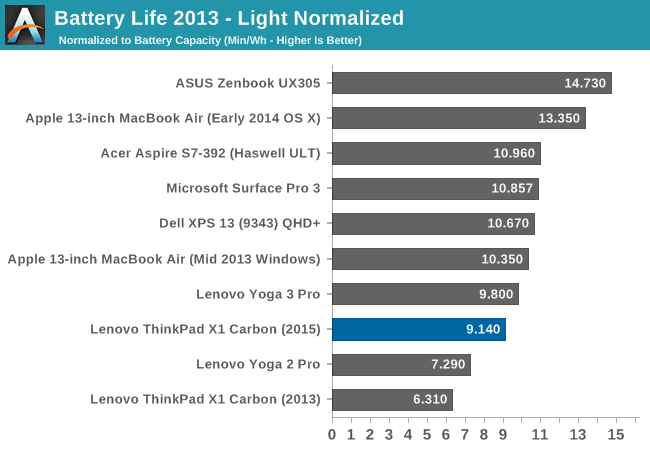
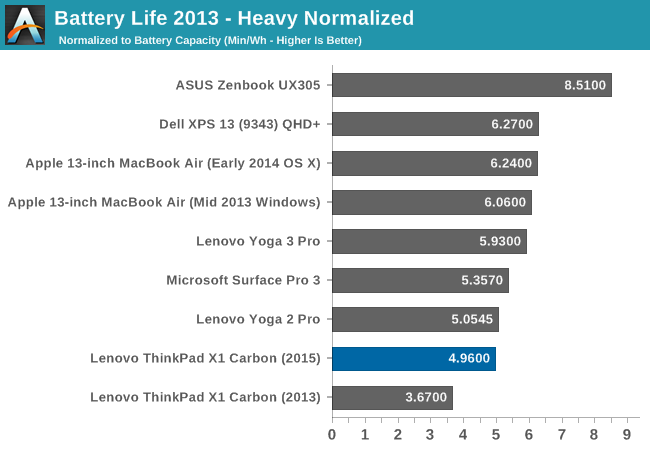
The light result shows that the X1 Carbon is not that much less efficient than some of the competition, but it also has one of the smallest batteries at 50 Wh despite this being a 14-inch notebook. Dell squeezed a 52 Wh battery into the XPS 13 this year despite the much smaller dimensions facilitated by the small display bezels. The heavy graph has an even worse result. Battery life is not the forte of the X1 Carbon. Even though it is not the battery life winner, taking a look at the Ivy Bridge powered X1 Carbon for 2013’s score really underlines the big gains seen in efficiency. Just two years ago, the X1 Carbon was about mid-pack in efficiency (see our review here) and just two years later the new X1 Carbon is almost 45% more efficient than the 2013 model, and yet it is almost at the bottom of our Ultrabook chart for battery life.
Charge Time
The X1 Carbon sports Lenovo’s Rapid Charge technology which will let you charge 80% of the battery capacity in just 30 minutes. Lenovo says that they use high current rather than high voltage to increase the battery charge rate, which they claim helps battery longevity. Whichever it is, the X1 Carbon does offer some pretty fast charging.
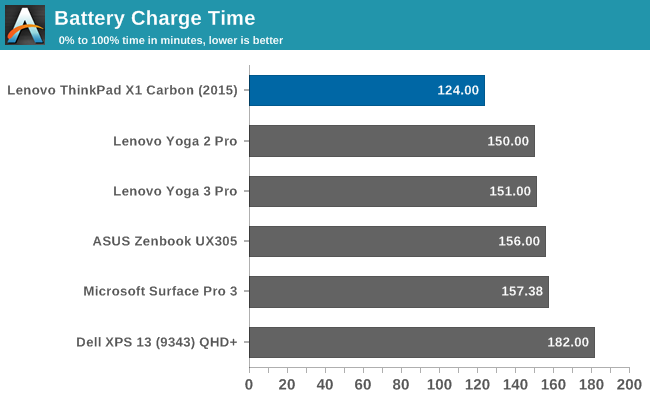
With the included 45 watt adapter, I was unable to reach the 80% in 30 minutes, but with the higher output adapters it could happen. Even with just the 45 watt model 80% happened in just 69 minutes which is very impressive, and a full charge took just over two hours. The battery life may not be at the top of the charts, but luckily if you do drain the battery you can get it back to a reasonable level in not too long.


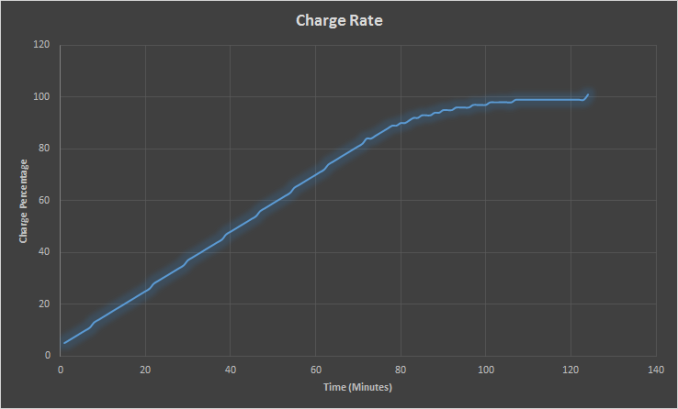








103 Comments
View All Comments
Valantar - Thursday, May 21, 2015 - link
An IBM design? In... 2012, if Google serves me right? After Lenovo bought IBMs whole PC division in 2005? I'd like to see some kind of corroboration, please.While it's true that my experience is limited, my X201 is doing fine after long years of hard usage - the only issue I ever had was an SD reader with slightly subpar performance, which Lenovo promptly replaced as soon as I reported it. Great end-user customer service. The battery even has around 80% of its capacity after all that time.
Compared with the HP ProBook I bought for my mother around the same time, that had constant firmware/driver issues, and failed after about three years of very light usage (display failure). I've heard similar experiences from colleagues using ProBooks and EliteBooks too.
I see a lot of 'ThinkPads suck ever since Lenovo' going around, but I can't help seeing that as a combination of bad luck (getting your first faulty unit after the ownership change) and just plain resistance to change. YMMV.
Samus - Thursday, May 21, 2015 - link
Everyone in my IT circle avoid Lenovo equipment like the plague among all their clients. The one guy who did use Lenovo, exclusively, is in the process of closing his business and dissolving his corporation because of super fish fallout and generally unhappy customers due to poor Lenovo support. Reliability is indeed s YMMV but with hp elitebook a they come the next day to your door and rebuild the thing in front of you for 3 years.sandy105 - Friday, May 22, 2015 - link
funny guy ..T2k - Friday, May 22, 2015 - link
Oh PLEAHHSE. I literally don't know ANYONE with an HP laptop in my immediate circles but every AWS, Rackspace, SIGGRAPH etc conference I still see a LOT OF Thinkpads, even regular Lenovo laptops, stop spreading BS, please.Samus - Friday, May 22, 2015 - link
You obviously do not realize that HP Corporate is twice as large as Lenovo's Corporate presence. HP commands around 70% of the world server market where as about 15 other companies make up the remaining 30%. Proliants literally run the world.As far as laptops, the US military has used Elitebooks exclusively for years...and very few healthcare sectors use Lenovo for the same reason: they're a Chinese company.
But there is no real debating that Elitebooks are better than Thinkpads dollar for dollar. Stop thinking of Best Buy when you think of HP equipment. Best Buy sells to suckers, not enterprise. I I can't find the article right now and I'm pretty sure it was Forbes or WSJ but I read nearly half of fortune 500 companies are exclusively HP houses. It also helps HP is in the printer business so companies can keep their accounts in one place.
Does any of this make HP better than Lenovo? No. But if you've ever actually disected an Elitebook next to a modern day Thinkpad you'd quickly realize, if you have any concept of quality, that the Elitebook was designed by brighter minds with less cut corners.
The only reason Lenovo has overtaken HP in sales over the past two years comes down to economies of scale: Lenovo can mass produce more crap than HP can, so they are cheaper. In this economy people are buying based on price, not quality. Look how many KIA's and Chrysler's are on the road.
CoolRunnings - Wednesday, May 27, 2015 - link
Actually the army uses Dell Latitudes last I saw... I've got hundreds of Thinkpad T420 and T430 laptops in my customers hands and have had the fewest number of issues with those of any series of laptop I've used. They're not perfect by any stretch but all those griping about Lenovo having ruined the Thinkpad brand since 2006 must have forgotten the terrors of the T40-T42 series and their GPU from hell problems or the brittle plastic on the T20 series. I've worked on Thinkpads since the T20 came out and the T420-T430 series have by far been the best built in my experience. The keyboard in the T60's was better in some ways though. Now when you start talking of the T440+, yep, agreed, they tend to suck in comparison...T2k - Friday, May 22, 2015 - link
Same thing here, my ~5 years old X201 is still working (sans a loose power connector and the Thinklight that usually refuses to turn on.) I would never trade it for any HP, sorry. Heck, I'd rather get a VAIO with their hybrid graphics any day than an overpriced, bloatware-ridden HP, that's for sure.Samus - Thursday, May 21, 2015 - link
Casualuker, you are an idiot. The last ibm design were the T40 and X40 series. Lenovo was allowed to use the IBM logo on the abysmal T60 series under license but the 60 series were Lenovo design and had chronic reliability problems ranging from failing cathod inverters to warped cooling fans.The T43 and X41 were the last good thinkpads. I still see them in use on occasion...15 years later. Some X40 series machines even have 60gb ssd's.
CasualUker - Friday, May 22, 2015 - link
@Samus, if you say so. The truly last bit of IBM imprints where the Tx30 series. If you don't believe me that's fine.Samus - Friday, May 22, 2015 - link
I don't need to believe you, because you are wrong.http://forum.thinkpads.com/viewtopic.php?t=72128
Lenovo hasn't had license to use the IBM logo since 2005. You are confusing the IBM logo with a Thinkpad logo or something...because there are NO IBM LOGO'S on the last decade of Lenovo Thinkpad, ThinkCentre, ThinkServer, and so on...